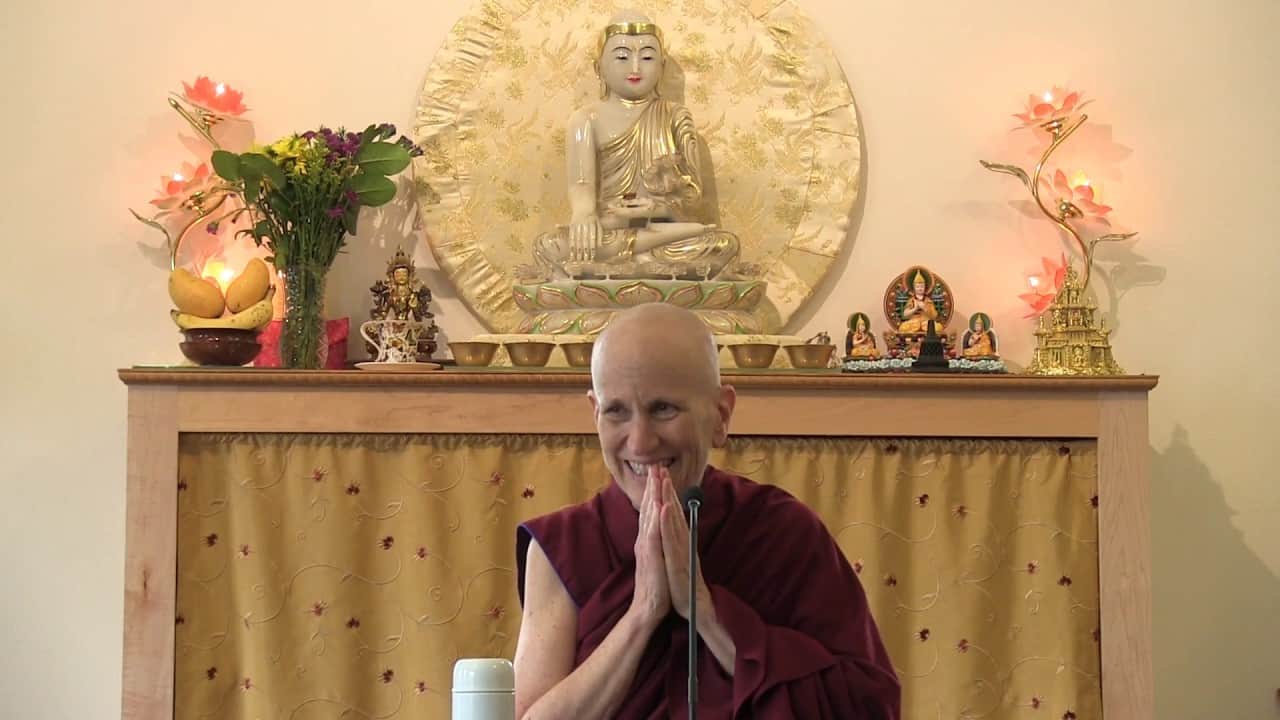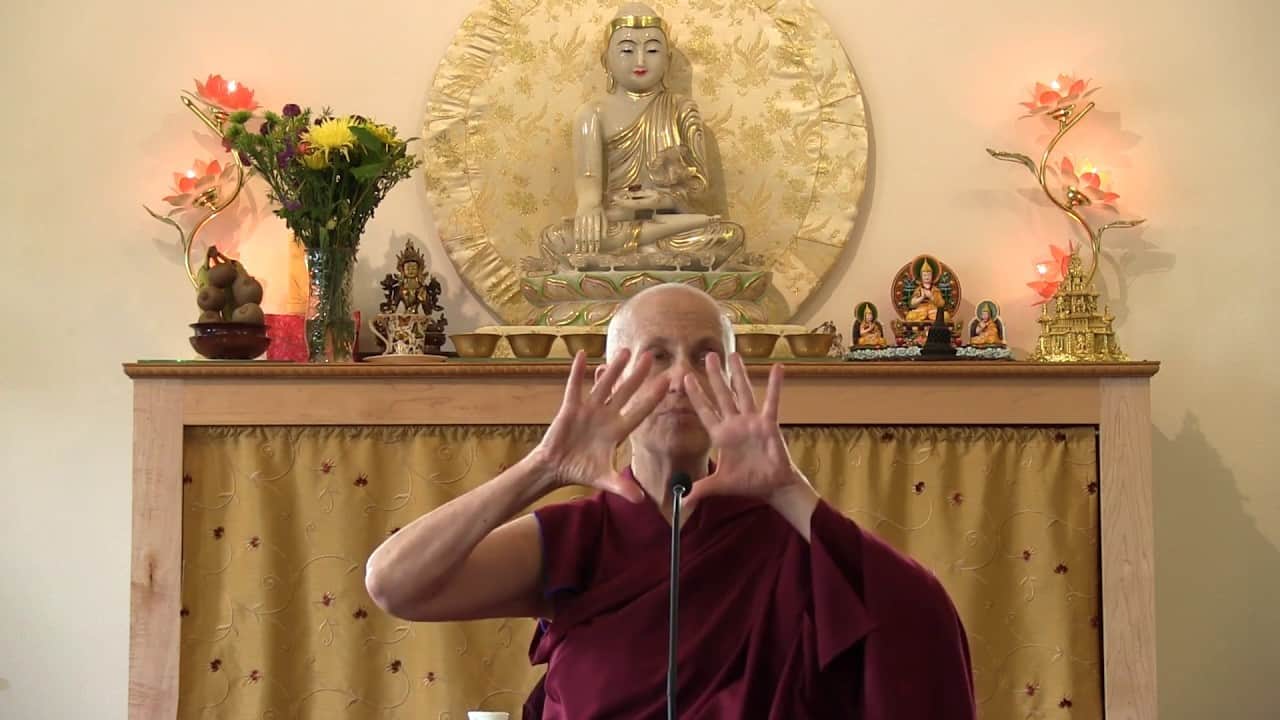Precious treasures
Part of a series of short Bodhisattva's Breakfast Corner talks on Langri Tangpa's Eight Verses of Thought Transformation.
- Labelling other people “toxic”
- Working with the mind in situations where we find other people difficult
- Looking inside our own mind for why our buttons get pushed by certain behaviors
- How to see people we’ve labelled “difficult” as precious treasures
Whenever I meet a person of bad nature
Who is overwhelmed with negative energy and intense suffering
I will hold such a rare one dear
As if I had found a precious treasure.
Whenever I meet a person of bad nature (like students who don’t remember what their teacher said), who are overwhelmed by negative energy (constantly complaining), and intense suffering (like a stubbed toe…). When that happens, I will hold such a rare one dear, as if I had found a precious treasure.
Thank you, precious treasures. Yes, you definitely are. [laughter]
A rare and precious treasure, and you’re going to lead all of us to full awakening, because you give us the chance to practice patience.
“When I meet a person of bad nature, who is overwhelmed by negative energy and intense suffering.” Got somebody in mind? Yes? Somebody who just drives you crazy. Yourself?
Some people don’t like being near sick people, it’s scary to them. That kind of suffering scares them. Other people don’t like being around people who are mentally imbalanced. They get frightened about that. Other people don’t like being around people who are drunk or on drugs. That freaks them out. Other people don’t like being around authority figures. That’s not necessarily somebody of bad nature, but it’s somebody we shake around. We don’t like being around people who push our buttons, because they know us quite well, and our buttons easily get pushed and we go off, and then we blame it on them. There are lots of these kinds of situations where we don’t like being with other people.
Every few years there’s a new word. There was a period when “toxic” was the word. I have a toxic family. My mother is toxic. My father is toxic. The drugs I take are okay, but these people are toxic. Putting it out there on everybody else. That these people have a problem, and they have intense suffering, and something is wrong with them, and I don’t want to be anywhere near them. That’s the ordinary viewpoint.
From a Buddhist viewpoint, what’s happening is the other person is just doing what they’re doing, but it’s us and our buttons that are getting triggered and we’re making that person into somebody we can’t stand to be around.
Is the other person toxic? Or is it our mind that is toxic? Is it our mind that our emotions are uncontrolled, our mind gets confused, we don’t know how to handle certain situations, we don’t know how to respond to certain people, and so we say those people are toxic, they have intense suffering, they’re full of negative energy. And from a Buddhist viewpoint, yes, they’re probably sentient beings, and they have problems, like all of us do, and they create negative karma like all of us do, and they have afflictions like the rest of us. But why is it that that person becomes a “toxic” person for me, but is somebody that you love and think is great.
That’s the question. If the other person, if it was solely in the other person, everybody would see that other person in the same way. Which is probably why we enjoy when other people criticize the same people we criticize, because it just helps us validate our own opinion of somebody else. But from a Buddhist viewpoint, all of this is like judgment coming from our own mind, and it’s our own buttons. “I feel uncomfortable being around a person who has this kind of problem. Why do I feel uncomfortable? Because I don’t know how to respond. Or I feel insecure. Or I feel afraid.” But when we don’t recognize what we feel, then we say it’s the other person.
An example is, you often hear me talk about “yes, but” people. The people who come and they take up your time and they tell you a long, long story which you realize, you can tell by the way they’ve told it that they’ve told it many, many times to many, many people, and they ask you for advice, and you give advice, and they respond with, “Yes, but….” And then you give more advice, you try a different tactic, and again they respond, “Yes, but….”
These people push my buttons. I really don’t like it. But when I look inside and I ask myself what are the buttons, why do I react so much to “yes, but” people, it really becomes kind of like a treasure hunt to find in myself what is the answer to that question. What is it about that behavior that drives me crazy? Is it because they’re using my time? Is it because I feel like I should be able to help them, but I’m not able to? Or I should be able to satisfy their concerns, but I’m not able to, so I feel uncomfortable with myself? What is the reason why that kind of behavior drives me crazy?
If we can do this kind of treasure hunt—inner reflection—and the treasure is to find that afflicted part of ourselves, that we can then shine some light on and see how it’s afflictive, and how it doesn’t make sense, and how it comes from my judgment and my fear, or whatever is going on in me. Because other people find that person completely okay. And that person can “yes, but” and it doesn’t drive the other person crazy. But me, I’ve learned, two “yes, buts” and that’s it. Because I used to go on with “yes, but” people for a long time and wind up with nothing. So, to look inside and why do I feel uncomfortable when I wind up with nothing after a while with those people. Well, I like to feel successful. I like to feel like I’m able to help somebody. But you can’t help a “yes, but” person. I think that’s been part of my learning in it, is when somebody is saying “yes, but,” I don’t try and help them. If I just relax and accept the situation, and don’t feel like I should be able to help them, then I probably wouldn’t be so irritated by their behavior.
I’m just using this as an example. Everybody has their own kind of thing. A certain person, or certain kind of behavior. But what I’m getting at is when these things arise—and they come up all the time—instead of pointing the finger at the other person, to look inside and say, “What’s my button? Why is this difficult for me?” Because if we can find the answer to that, then we can learn how to make our own mind comfortable with that situation, and then the problem ceases.
We could have any number of things, even very innocuous things, that drive us crazy. Some people don’t like being asked to give to a charity. They will give to a charity, but they want to think of it themselves and then give. They don’t like when other people ask. Well why is that? And looking inside and trying to answer that.
It’s very interesting.
Communicating?
We can see sometimes the applications of people who want to come here. We may read it, and read something about their background, and for some people that just sets them off. And other people read the same thing and say, “Oh, let’s support this person.” Then the question is, what part is coming from me, and the second question is can we effectively support this person and maintain this place as a monastery? There’s also that question. Just to look.
This is also something to investigate when see our different prejudices. We may have prejudice against different kinds of people, for whatever reason. All the people who wear mismatched socks, which is now the rage. Remember when you were in school and your socks didn’t match and you got in trouble, and your mom made you change socks? Now it’s the latest fad, everybody likes to have mismatched socks. Somebody shows up here with mismatched socks, and we’re like, “What’s going on with that person? This indicates…” and we have a whole profile for the kind of person who wears mismatched socks.
Just to look at whatever biases we have. Or the instant judgments we have of other people. And question where is that coming from in me? And then if we can make peace with it, it actually opens the door for our mind to be quite free, and to really engage with all sorts of people.
We see these people as precious treasures because they are giving us the opportunity to learn something about ourselves that otherwise we would not have learned. And they point something out to us about our own prejudices, our own insecurities and fears, that we would have either not known about, or known about and tried to ignore, but now this person–whether they’ve intended to be kind or not is not the question–has brought this opportunity to me to look at this part of myself and clean it up and make peace with it.
It’s a hard practice confronting these things in ourselves and admitting them. Admitting them is very hard. Because we like to think of ourselves as open, accepting, benevolent, tolerant people, but then these people show up that contradict our self-image and we like to blame them. But the real thing is to use it as an opportunity to clean up what’s inside.
Anybody have an example they want to share?
Audience: When I encounter the “yes, but” response, the other thing that I’m reacting to, I can see that the eyes glaze over as I give a suggestion, and they’re just not listening, so I don’t feel heard, and they’re just waiting for me to stop so they can say “yes, but.”
And then as an example, one of our dear friends sent us a photo of himself heavily tattooed before he arrived. He was afraid that we would reject him. And of course there was no rejecting possible there.
Venerable Thubten Chodron (VTC): But some people reject people who are heavily tattooed. And some people reject people who don’t have tattoos. So you can’t win.
Audience: There have been a number of young people who have come here in the past couple of years…well they come here all the time. But for the…students and the high school students. And in my mind, all the young people are like vacant in their mind and self-centered, you can’t have a good conversation with them. So I’ve been so amazed by these kids. But I’m sure it’s my conception of teenagers, that’s all, rather than these kids are so phenomenal. I think they are probably a little bit more developed than…. Well, I can’t say. So yeah, I think my conceptions have been shown to be not so accurate.
VTC: It’s sometimes rather pleasant when we find our conceptions are wrong. Isn’t it? You have this whole image of what somebody’s going to be like, and they’re not like that at all.
Venerable Thubten Chodron
Venerable Chodron emphasizes the practical application of Buddha’s teachings in our daily lives and is especially skilled at explaining them in ways easily understood and practiced by Westerners. She is well known for her warm, humorous, and lucid teachings. She was ordained as a Buddhist nun in 1977 by Kyabje Ling Rinpoche in Dharamsala, India, and in 1986 she received bhikshuni (full) ordination in Taiwan. Read her full bio.


